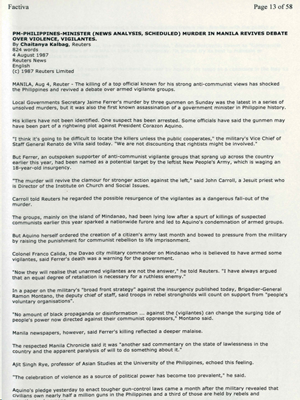PM-PHILIPPINES-MINISTER (NEWS ANALYSIS, SCHEDULED) MURDER IN MANILA REVIVES DEBATE OVER VIOLENCE, VIGILANTES
[Reuters]
Published date: 4th Aug 1987
4 August 1987
Reuters News
English
(c) 1987 Reuters Limited
MANILA, Aug 4, Reuter – The killing of a top official known for his strong anti-communist views has shocked the Philippines and revived a debate over armed vigilante groups.
Local Governments Secretary Jaime Ferrer’s murder by three gunmen on Sunday was the latest in a series of unsolved murders, but it was also the first known assassination of a government minister in Philippine history.
His killers have not been identified. One suspect has been arrested. Some officials have said the gunmen may have been part of a rightwing plot against President Corazon Aquino.
“I think it’s going to be difficult to locate the killers unless the public cooperates,” the military’s Vice Chief of Staff General Renato de Villa said today. “We are not discounting that rightists might be involved.”
But Ferrer, an outspoken supporter of anti-communist vigilante groups that sprang up across the country earlier the is year, had been named as a potential target by the leftist New People’s Army, which is waging an 18-year-old insurgency.
“The murder will revive the clamour for stronger action against the left,” said John Carroll, a Jesuit priest who is Director of the Institute on Church and Social Issues.
Carroll told Reuters he regarded the possible resurgence of the vigilantes as a dangerous fall-out of the murder.
The groups, mainly on the island of Mindanao, had been lying low after a spurt of killings of suspected communists earlier this year sparked a nationwide furore and led to Aquino’s condemnation of armed groups.
But Aquino herself ordered the creation of a citizen’s army last month and bowed to pressure from the military by raising the punishment for communist rebellion to life imprisonment.
Colonel Franco Calida, the Davao city military commander on Mindanao who is believed to have armed some vigilantes, said Ferrer’s death was a warning for the government.
“Now they will realise that unarmed vigilantes are not the answer,” he told Reuters. “I have always argued that an equal degree of retaliation is necessary for a ruthless enemy.”
In a paper on the military’s “broad front strategy” against the insurgency published today, Brigadier-General Ramon Montano, the deputy chief of staff, said troops in rebel strongholds will count on support from “people’s voluntary organisations”.
“No amount of black propaganda or disinformation … against the (vigilantes) can change the surging tide of people’s power now directed against their communist oppressors,” Montano said.
Manila newspapers, however, said Ferrer’s killing reflected a deeper malaise.
The respected Manila Chronicle said it was “another sad commentary on the state of lawlessness in the country and the apparent paralysis of will to do something about it.”
Ajit Singh Rye, professor of Asian Studies at the University of the Philippines, echoed this feeling.
“The celebration of violence as a source of political power has become too prevalent,” he said.
Aquino’s pledge yesterday to enact tougher gun-control laws came a month after the military revealed that Civilians own nearly half a million guns in the Philippines and a third of those are held by rebels and unauthorised persons.
The uproar over Ferrer’s death has swamped a call for moderation from a man familiar with the politics of violence.
“The more the left acts radical now, the more it will be isolated,” Bernabe Buscayno, known as “Commander Dante”, one of the founders of the NPA in 1969, said yesterday. “It should try its best to maintain or strengthen its place in the mainstream.”
Buscayno was freed from 10 years of imprisonment last year by Aquino. He stood as a candidate in the May 11 congressional elections but lost.
Carroll said Ferrer’s killing could have also been an act of desperation by a radical left that is on the defensive after failing to mobilise mass support.
“Ferrer was most attractive to the right and therefore an obvious target for the left,” he said.
Whatever the setbacks the NPA may have suffered, said Montano, it was still powerful.
He said the “rag-tag group of ill-armed, untrained and poorly provisioned handful of wild-eyed revolutionaries “had grown into a formidable force of 24,430 that controlled a fifth of the country’s 42,000 villages and was supported by a mass base of over 1. 7 million people.
In the provinces, four youths believed to be NPA rebels shot dead two policemen on motorcycles in Cebu city today and a guerrilla band raided a logging firm in southern Surigao del Norte, holding hostage an undetermined number of workers, the Philippine News Agency reported.
Soldiers sent to rescue the hostages clashed with a rebel’s but there was no immediate report of casualties on either side.
In northern Abra province, rebels ambushed an army patrol on Sunday, wounding a captain and six other soldiers.






